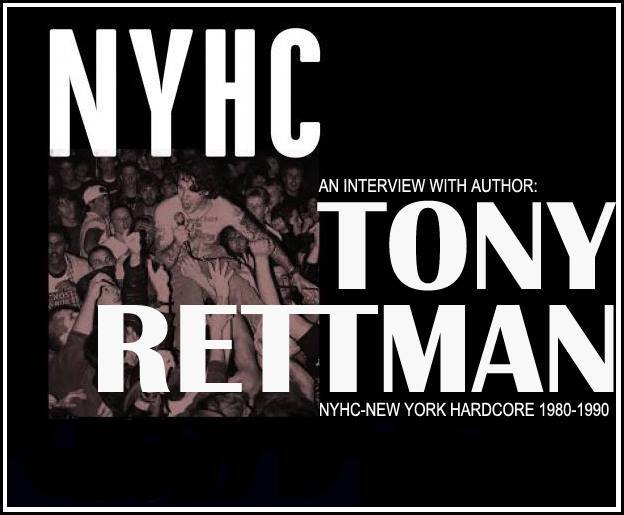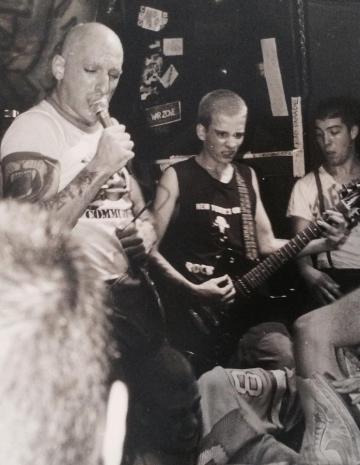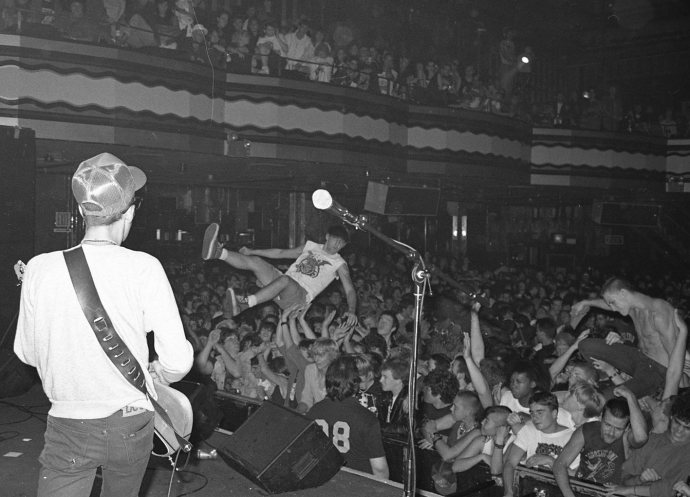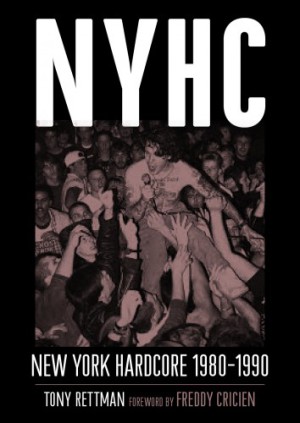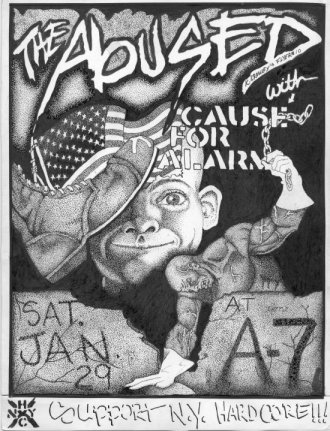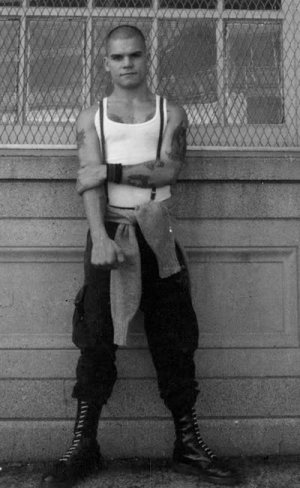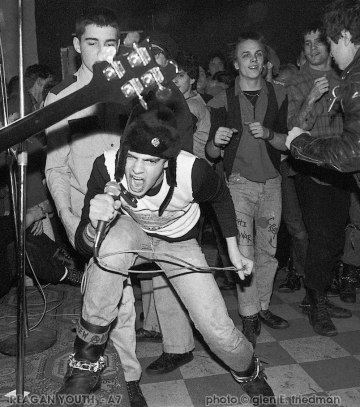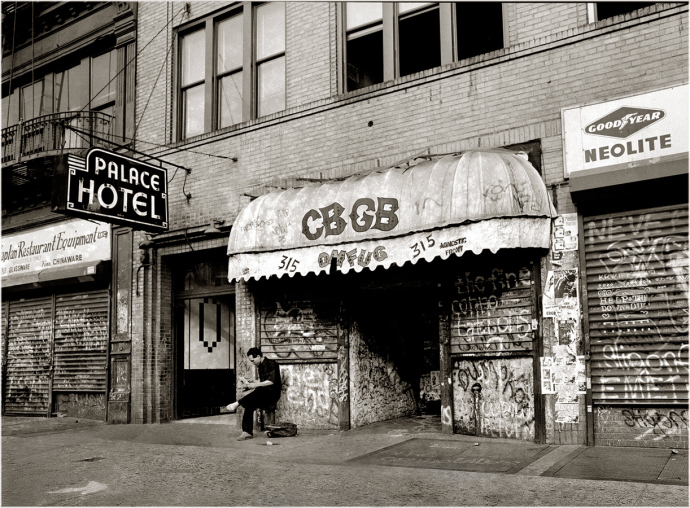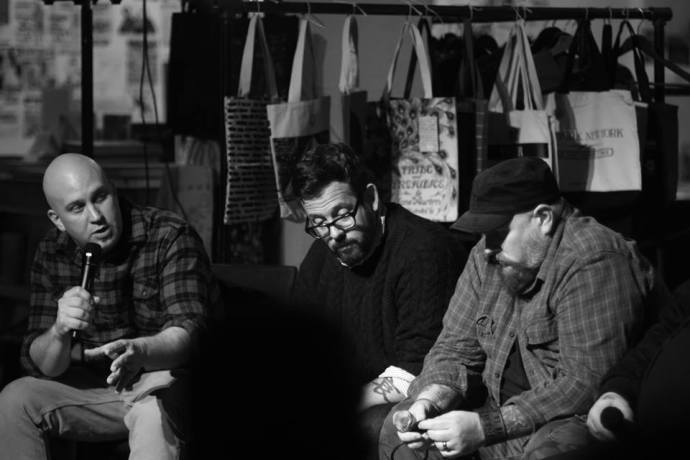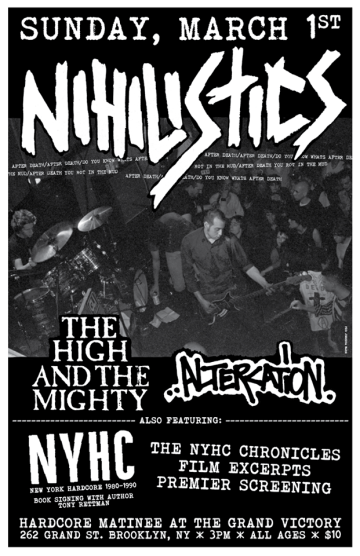“NYHC-New York Hardcore 1980-1990” is a new book by local hardcore dude Tony Rettman who has been involved with the NYHC scene for ages. I found it to be an amazing read done the right way with an almost fanzine feel to the whole thing. The one thing that usually pisses the hardcore faithful off to no end is the insurgence of people outside of the scene coming in to try and do something they have no business doing and that is exactly NOT the case here as Tony is genuine and basically hit a fucking grand slam out of the park in the bottom of the ninth inning. If you have that NYHC itch, you know that itch, you probably do, then this book is for you with its insanely in depth look at a 10 year period from the eyes, ears and mouths of the people that lived and breathed it. We caught up with Tony in this February 2015 interview. Ordering information follows at the end of the interview.
IE: Hey Tony, first off I want to say thanks for putting out one helluva great book there. It is obvious during and after reading it that a ton of hard work went into it. I am not the type to sit down and read a book cover to cover in 4 days but that is exactly what I did. When and how did the idea to put out this book come about?
Tony: Thanks for the compliment. I really appreciate it considering your long term involvement in the NYHC scene. I wrote an article for the Village Voice back in ‘08 when that A7 reunion happened at the old Knitting Factory. I ended up conducting way too many interviews than I should have for an 800 to 900 word piece, just because I was so psyched to write the piece and pick the brains of people who were involved early on in a scene I was so infatuated with. Around the same time, I started work on my 1st book, “Why Be Something That You’re Not - Detroit Hardcore 1979 – 1985” and I thought that maybe if everything went as planned, a book about NYHC would be next on deck.
After the dust cleared with “WBSTYN” in 2010, I went back and listened to the interviews I conducted for the A7 article and I suddenly felt very overwhelmed. The obvious hit me that this was a scene with many facets and subgenres. It just seemed like it would be too much of a headache and went ahead trying to get other book ideas off the ground while doing freelance writing work for Vice, Village Voice, AOL Music, etc.
Somewhere in 2012, Ian Christe of Bazillion Points Publishing and I were throwing ideas around for a book I could write and I told him about the idea for the NYHC book and he was game. It was then I threw caution to the wind and decided to give it a go. In the end, I’m happy I went through with it. No regrets!
IE: For people who may be finding out about this book for the first time give us a brief run down on what they can expect out of NYHC 1980-1990.
Tony: The book covers the first decade of hardcore in New York. It starts out with the likes of the Stimulators, Heart Attack and Even Worse and then delves into the A7 scene of Agnostic Front, Cause For Alarm, Antidote, Urban Waste and more. For the 2nd half, there’s the glory days of NYHC with crossover, straight edge and the starts of Sick of it All, Breakdown, etc. and then we end it off with the three pronged direction NYHC went into in the 90’s with the ABC No Rio scene of Rorschach, Born Against, etc, the “post core” of Quicksand and Into Another and the diehard NYHC of Madball, Crown of Thornz, etc.
“In other parts of our neighborhood, guys were breakdancing against each other; we were moshing against each other. It was all about who had the most style, as opposed to today where it’s just picking up change and karate kicking. It was all about trying to keep dancing, while still blasting into someone from D.C. or Boston, and all about who had the hardest pit for their town’s band. It was like supporting your city’s hockey team or something.”—Jimmy G, Murphy’s Law
MURPHY'S LAW @ THE RITZ, NYC. PHOTO BY: KEN SALERNO
IE: How does the process work in regards to putting out a book on this level? You had the idea obviously to do it but once you had the idea hatched and saw Ian from Bazillion Points had interest what did you have to do next?
Tony: Ian over at Bazillion Points Publishing was keen to work with me when he saw first hand the hustle I put into the promotion of “Why Be Something That You’re Not”. So, it seemed there was always something of an open invitation to do something with him. So when I pitched the idea of the NYHC book to him, he was more than game. But, having said that, I still had to put together a proposal for the book basically telling “why” he should publish the book. I also had to put together a chapter outline and gather up clippings of the press the previous book got, etc. and present that to him. That’s the way it normally goes when you’re trying to sell a book.
IE: Your background in the NYHC scene reaches way back to I'm guessing the mid 80's. Was it difficult for you to come up with questions for the band's interviewed that came before you came on to the scene?
Tony: Actually, I had way more questions for people from the early times than the people I was familiar with. Since I wasn’t there to witness it first hand, I wanted to get the facts from those who were there.
IE: What kind of pre interview research did you do (if any) for the early parts of the book that were dealing with the early 80's before you started going to shows?
Tony: I guess my “research” was just digging through old ‘zines. I’ve always been a nerd boy who loves to do that type of stuff, so it wasn’t that hard.
IE: You are no stranger to putting out zines and books. Can you give us a little background on when you started going to hardcore shows and how you came into putting out zines and books?
Tony: My brother started taking me to hardcore shows in the summer of 1984. I started doing hardcore ‘zines around 1986. I did a ‘zine by myself for a while from 1986 to 1988 and then joined forces with Tim McMahon (Mouthpiece, Hands Tied, Double Cross web ‘zine) to do a ‘zine named Common Sense and we did only two issues of that. I started doing ‘zines just because I wanted to be part of the hardcore scene and that seemed like the easiest way to delve in without starting a band, putting on shows, etc.
IE: I think you told me there were about 116 total interviews done in the making of this book. Most of them were done by phone or in person. Out of all of these interviews who would you say were the easiest people to interview and why?
Tony: Pretty much everyone I spoke to was pretty easy to talk to. No one seemed really guarded. No one refused to answer a question or anything like that. I think everyone could read I was a fan who just wanted to know more. I wasn’t digging for any dirt or anything like that.
“New York City has an energy that you’re not going to find anywhere else. People who have that passionate, driven mindset; they gravitate to New York City. You couldn’t match it anywhere else. Even being in that intense environment—you had to come into your own to survive that area.”—John Porcelly, Youth of Today/Shelter
IE: When you were doing the interviews which ones hit you right away where you thought to yourself "this one is gonna be amazing when this book comes out"?
Tony: Off the top of my head, I can say Mike Judge’s interview was great. Ever since I was a kid I had this thing built up in my head of him being this self protected enigma but he was pretty much open to talk about anything. And he’s got a great sense of humor to boot! In that same realm, Porcelly was fun to talk to. I ended up interviewing him twice and I could have kept on interviewing him if my phone didn’t die both times! The person I’m most happy to get in there is Duane from Some Records. I think he’s a real important part to that late 80’s puzzle of NYHC who doesn’t talk about this stuff that much, so I’m glad he’s in there. The interview I did with him got off to a rocky start, but once he got firing, he was amazing.
IE: It's widely known that the NYHC scene (especially early on) was a rowdy bunch. What were some of the things said during interviews that may have shocked you even after knowing some of the stories going in?
Tony: Nothing too shocking. Like I said before, I wasn’t digging for dirt. I just wanted to know about the music and the scene, so that’s what I asked about. The peripheral stuff around that -- such as fighting, etc. -- is a story that should be left for someone who was actually there to witness it. Plus, if you really want to read about stuff like that, there’s plenty of stuff on the internet to dig into in that regard.
IE: Was it hard to track down many of the people you eventually interviewed? Who was the hardest and what was the greatest length you had to go to eventually track someone down?
Tony: Tracking down people is really easy these days due to the internet! That’s how I hunted down most of the people I interviewed. After that, it got difficult in just finding a time/day to get together to talk. That proved more difficult than the actual hunting.
IE: One person that is mentioned many times but not actually interviewed is Cro-Mag Harley Flannigan. You told me you went to great lengths to try and get him in the book but it just didn't happen. How deep into it did you go trying to track him down and now that the book is out do you have any regrets on not being able to get him involved solely for the amount of additional stories he could have added on?
Tony: I reached out to him personally via e-mail, Facebook, etc. and received no response. I then had a few people who I knew were still close to him reach out to him and they got the same treatment. Honestly, I don’t blame him. He doesn’t know me from a hole in the ground and I’m sure he’s gotten way too many requests of the same nature in the past 15 years or so. How am I different than any of these other chooches he’s received random e-mails from? People mention him in the book and they acknowledge him as a super important part of the scene, so his place is held in the book with respect. At least I think so.
IE: Were there any other people that you initially had in mind that you didn’t get around to interviewing?
Tony: I would have liked to get people in there from the early, early days from these bands you just hear about or read about in old ‘zines. People from bands like The Influence, The Offals, The Doughboys, Mark Truthe and The Liars, etc. They proved hard to track down.
IE: The NYHC scene has had its share of tragedies and people passing way before their time. Was there any one person who you thought “damn, I wish they were still around” to ask them some questions? Who would it have been and what do you think you could have asked them if they were still with us?
Tony: I would have loved to interview Dave Insurgent from Reagan Youth. I just would have asked him about those early days of Max’s Kansas City, the Queens insurgence onto the early NYHC scene and how he developed his political beliefs. Of course, Raybeez would have been great and I’m sure Chuck Valle would have been a hoot to talk to as well.
IE: You said the majority of the 100 plus interviews were done by phone or in person. How was the process of transcription from voice recordings to having them typed out for you? Does the word transcribing bring fear to you now after doing so much of it?
Tony: I did all the transcription myself, barring a few done by my lovely wife, Danielle. My process was very robotic. As soon as I completed an interview, I’d transcribe it as soon as I got off the phone or came home. After doing two books of this nature, I’ve really gotten the rhythm down in regards to transcribing and then seeing where it fits into the mix of the book. Don’t get me wrong, transcription totally blows dog dick, but it beats doing the normal shit job I got to go to for the majority of the week. If I had to spend the rest of my life doing books like this and transcribing 8 hours a day in my kitchen, it would be better than dealing with people in general…that’s for sure.
“At that time, the Lower East Side was a warzone. It wasn’t the gentrified neighborhood that it’s been for the last twenty years. It was a fucking warzone, without question. It was worse than the worse neighborhoods you know in New York City today. It was a trip to be down there and go to those bars and A7 and shit like that. I wasn’t even eighteen yet, and I was getting a peek into a world that most people will never see.”—Eddie Sutton, Leeway
IE: I read a lot of things in the book that I never knew before. A lot of stories that I never heard before or were add on’s to ones I have already heard. From the feedback you have gotten since NYHC's release has this been the case with a lot of the readers and what are some of the things you personally may have learned from doing the interviews?
Tony: Some people have said they got something of a fuller story on some bands from the book and that’s great. For me, I just learned piddly nerd stuff. Like how Parris Mayhew was in a later line-up of The Mad. How Roger played bass in early line-ups of the Cro-Mags and Sheer Terror. I learned Stigma was in a band in the mid-70’s called Future Shock he called “new age”. I gotta hear that stuff!
IE: When the book reaches the year 1990 and starts wrapping things up with bands like Orange 9mm, Quicksand and Into Another it seems like you could have kept going at this point. It feels natural almost for there to be a continuation. Have you even remotely thought about doing a follow up and if you did how much further along in the time line of NYHC would you be willing to go?
Tony: Many people have asked if they'll be a follow-up. Maybe later on down the line they’ll be one. Or maybe, in ten years time or so, we’ll do an edition that’ll tack 1990 to 2000 on the end? I’m not promising anything. Who knows. Right now, I’d like a little breathing room. I squeezed the history of ten years of NYHC into a little over a year of my life. Let me just sit by the fireplace and have a beer for now, you know?
TONY WITH RICHIE UNDERDOG & MIKE JUDGE DECEMBER 11, 2014 @ THE POWERHOUSE ARENA'S BOOK LAUNCH IN BROOKLYN, NY. CLICK PHOTO FOR VIDEO COURTESY OF: UPTOWN AL
IE: If you flashback to the time period that the book covers of 1980 to 1990 one thing that never would have happened back then are the book signings that you have had a few of to promote the book. I remember most bands back then refused to give autographs and would rather just shake your hand or just talk to you. Please tell us about the signings you have done so far to promote the book and does it feel weird for you to go up in front of a small crowd and talk about the book?
Tony: It's VERY weird to speak about the book. That's why in the past events, I’ve asked people like Drew Stone, Jeff Parlin, Mike Judge, Sean Taggart, Paul Bearer, Richie Birkenhead, etc. to join me. As much as a fan as I am of NYHC, I do not have the confidence to just sit up and there and talk about it. I might as well be any kid from Jersey who loved the stuff going up there and flapping my gums, you know? Who knows? Maybe it's a personal thing with me. I’m not the most social dude in the world. But I like the idea of doing an “in conversation” type thing where me and someone else talk about NYHC. The initial release event at Powerhouse Books was massive. There was an incredible turnout with a panel discussion with me, Paul Bearer, Richie Birkenhead and Mike Judge. It was incredible; one of the best nights of my life. The one in Philly at Brickbat with Drew Stone was intimate and fun. Drew’s a great story teller and people really ate it up. The one at Celebrated Summer in Baltimore with Jeff from Breakdown was a real good time. The bookstore next door that was working in conjunction with Celebrated Summer had a bar in the back of it! It was right across the hall, so Jeff and I were feeling VERY chatty and VERY goofy when we finally got up to take Q&A and talk. It was just a good, loose vibe; like two dudes having a few beers chatting in front of a enraptured audience. Hey...wait…that's EXACTLY what it was!
“I had my personal experiences from life; being on the streets, being locked up, and being in abusive foster homes. I was fighting. I was shot and stabbed, and that’s what came out. We sang about street justice and survival on the streets because that shit was for real. That shit was a way to express ourselves and get out that angst. It was real. It wasn’t some hypothetical bullshit.”—John Joseph, Cro-Mags
IE: How has the book been received in regards to sales and also with reviews? Is it a “success” to this point in your eyes and what were you viewing as a success in your opinion around the time leading up to its release?
Tony: The response has been surprisingly positive across the board. My idea of success was basically people enjoying the book and I could live to see another day. One or two people made a stink about something or other in the book, but that kind of stuff has been minor. You’re always going to have people like that. I never thought ever in my mind the book was going to have the response that it's received so far. It's truly insane to me. I’m not used to people having an interest in me or anything I do! But obviously, it has nothing to do with me really. It's the story of the bands, people and NYHC scene that makes the story. I was just the outlet that the story was told through.
IE: So what’s next for you and the NYHC book and do you have anything else you want to add before we wrap this up? Thanks for your time Tony!
Tony: We’re having a book release show at the Grand Victory in Brooklyn on March 1st with the NIhilistics, The High & The Mighty and Altercation. Drew Stone will also be screening a snippet of his upcoming NYHC documentary, so that's exciting. The editions of the book being sold there will be rubber stamped specifically for that show, so come out! And of course I'll be signing them as well. After that, there might be an event here or there. But like I said above, I'm a pretty quiet dude who enjoys privacy. The past year or two of my life has been a whirlwind getting this book together. So, I'd like some time to look out the window and just watch dust blow. Is that too much to ask?
https://www.facebook.com/nyhcbook/timeline
http://www.bazillionpoints.com/shop/nyhc-new-york-hardcore-1980-1990-by-tony-rettman/






